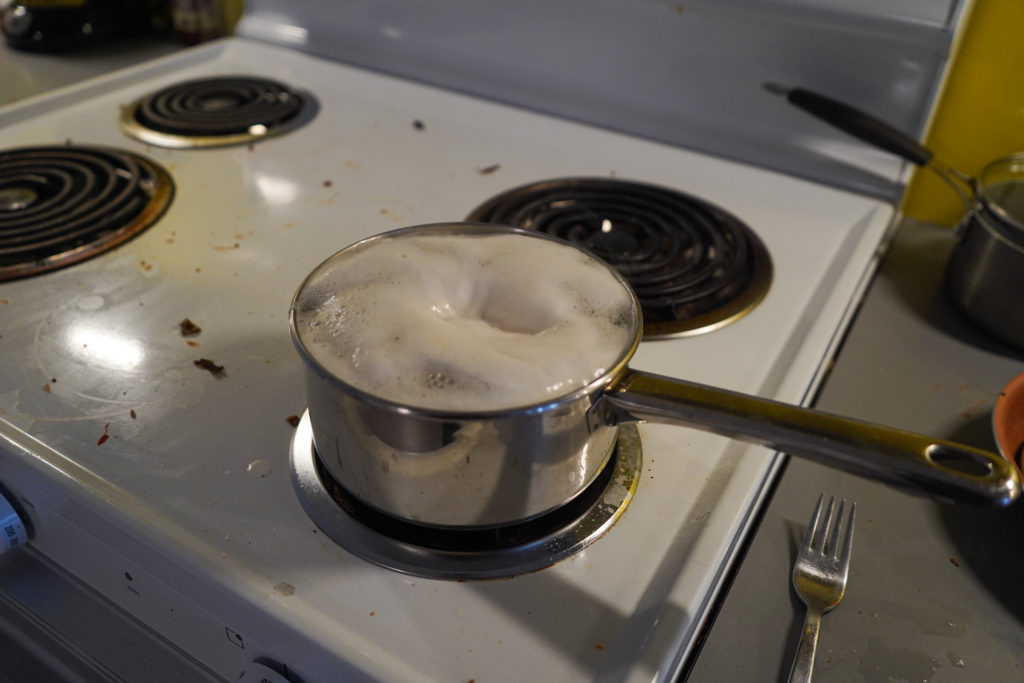District House residents have been forced to evacuate their residence hall nine times since the start of January because of a string of fire alarms triggered by kitchen smoke.
University spokesperson Crystal Nosal said six alarms were set off in January followed by three so far this month, each of which have cleared out the entire residence hall. She said students’ cooking has caused every alarm during the period, twice triggering alarms on back-to-back days, which has forced students to evacuate while they’re trying to quarantine, isolate or distance indoors.
“This is an opportunity to remind students who have just returned to campus about residence hall safety,” Nosal said in an email. “The increase in fire alarms in District House is solely related to cooking. Students should take the policy on banned items seriously and avoid bringing those items into residence halls. If students are cooking, they should supervise the cooking tools at all times.”
Nosal said kitchen smoke triggered six of the nine incidents and attributed two to cooking and one to a small oven fire. She said students who are isolating or quarantining because of COVID-19 still need to evacuate the building “in a safe and timely manner” like everyone else, ensuring they wear a face covering, abide by social distancing and return to their rooms “immediately” after the evacuation period ends.
All other students must also distance themselves from others during evacuations to uphold COVID-19 safety protocol, Nosal added.
“Students are responsible for evacuating the building in a safe and timely manner while wearing masks and maintaining social distance, as they do with everything else on campus,” she said.
Nosal said D.C. Fire and Emergency Medical Services has responded to the alarms, and responders have filed “general orders” about each incident involving DC FEMS. She said building supervisors analyze the situation when they arrive at the scene of an alarm to determine the appropriate response.
Nosal said only one fire alarm in 2021 has come from a building other than District.
Students living in the building said the evacuations create crowds of up to 40 people waiting to reenter the building, disrupting daily schedules and raising concerns about how to safely follow distancing protocols amid the COVID-19 pandemic.
Olivia Upham, a senior living in District House, said she doesn’t feel safe during the alarm evacuations because students pack together in a group of about 30 near the building’s entrance to escape the cold weather and wait to reenter the building. She said she takes the stairs to return to her seventh-floor room after leaving the crowded area since social distancing typically doesn’t occur on the elevators.
Upham said about half of the alarms have interrupted an online class or her work shift with the University Writing Center, during which she’s had to log off her computer to evacuate.
“It’s just wild – people are touching each other waiting to get back into the building,” she said. “It’s just so packed.”
Abigail Ingoglia, a sophomore living in District House, said two alarms went off while she was quarantining after testing positive for COVID-19 last month. She said she stayed isolated in her room during both evacuations and wasn’t sure how to balance COVID-19 and fire safety.
“I was worried I would get in trouble either way, leaving or staying, and I didn’t want to put anyone at risk,” Ingoglia said.
Ingoglia said dozens of students stand nearby when she evacuates the building onto H Street during a fire alarm, but security officers try to encourage students to distance themselves from each other. She said she hopes officials start to warn students ahead of a drill and continue to encourage “higher safety measures.”
“When they do drills, I don’t know if they are legally allowed to give us a heads up, but if they could do that, that would be great,” she said.
Senior Jane Meiter, who’s lived in District House for the past three years, said frequent fire alarms have always been common in the building, but they have never sounded this frequently.
During evacuations, which range from 20 to 40 minutes, Meiter said students try to distance themselves, leaving two to three steps of separation while descending the building but gathering closer together at the bottom of the stairwell as they head outside. Students proceed to “spread out” or visit a nearby store like CVS once they’re outside, she said.
“It’s quite loud and disruptive, and it says the same thing every five times: ‘Please evacuate the building,’” she said. “It’s just really frustrating and morale damaging. I would suppose you just feel like you’re being dragged out of your life every week.”
District has more occupants this spring than last semester after the number of students on campus tripled following two weekends of move-in last month.
Meiter said the absence of resident advisers could have contributed to the frequency of fire alarms because freshmen and transfer students in the building might not understand cooking protocol or fire alarm sensitivity and don’t have an RA as a resource for help.
The University issued students an email earlier this month after the second alarm in two days, reminding them about cooking safety, smoke detector information and evacuation protocol. But Meiter said the email was late in keeping the number of evacuations, potentially dangerous during the pandemic, to a minimum.
“I think that that was something that should have been given at the beginning when people arrived because it’s been a problem,” she said. “It’s always a problem.”
Henry Deng contributed reporting.








